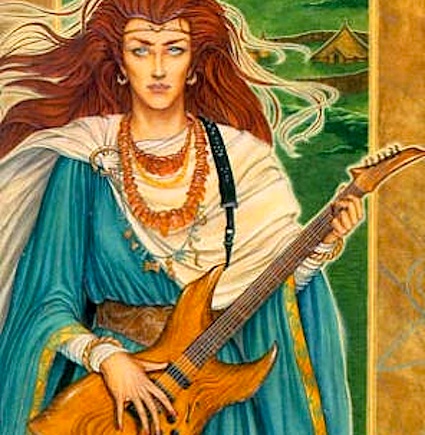Yes, we admit it: writing a sequel to our post about stand alone fantasy is a little…ironic. But your reaction to the first post was so enthusiastic and your reading suggestions were so great (LOOK AT THAT COVER OMG) that we decided to unleash our inner Peter Jackson and do another one!
So here’s a roundup of some of your standalone reading suggestions. Sorry if we missed any favorites—mention them in the comments, and we might just expand this into a trilogy!
The Lord of the Rings—J.R.R. Tolkien
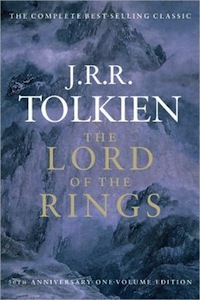
Well, OK. This was mentioned in the comments, and we cede the point. Technically they were released as one gargantuan, basically perfect book. It was only after the publisher decided they were too long for a normal human to want to read all at once that it was sliced into neat thirds. And obviously you can happily read LOTR without having read The Hobbit or The Silmarillion, or any of the various Unfinished Tales.
Plus, come on. It’s The Lord of the Rings. It should be on ALL THE LISTS.
The Palm-Wine Drinkard—Amos Tutuola
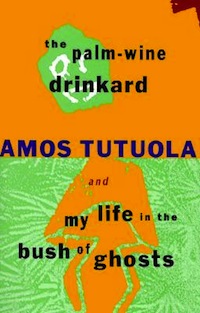
The Palm-Wine Drinkard is a controversial adaptation of Yoruba folktales. It tells the basic story of a man who travels to the land of the dead by following the palm-wine tapster, and updates folk stories into a more modern (circa mid-1950s) context. The book was widely praised when it was first published in the West, and it has since been both criticized for its depiction of its African characters and praised for its attempt to create an African analogue to the magical realism of Central and South America.
(Fun fact: Law & Order: SVU’s Odafin “Fin” Tutuola, played by friend-of-Tor.com Ice-T, is named after author Amos Tutuola!)
Who Fears Death—Nnedi Okorafor
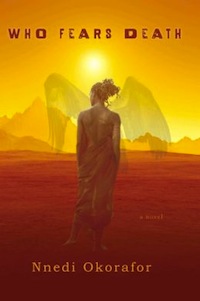
A newer book that wrestles with Tutuola’s legacy (among other things) is Okorafor’s Who Fears Death, which takes place in a post-apocalyptic future Sudan. The light-skinned Nuru oppress the dark-skinned Okeke, and practiced militarized rape. The book’s hero, Onyesonwu, is an ewu, the daughter of an Okeke woman raped by a Nuru man. As she gets older, her magical powers are reduced when she’s subjected to female genital mutilation, but she still must seek out and challenge her evil sorcerer father.
Okorafor drew on the war in Darfur for some of the elements of the book, as well as Igbo culture. The novel won the 2011 World Fantasy Award.
The Snow Queen—Joan Vinge
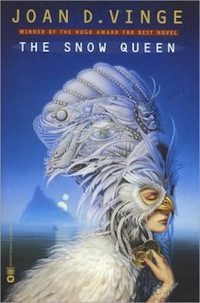
Yes, The Snow Queen—a sci-fi take on the Hans Christian Andersen tale—does have a sequel, but since it can also be read alone we included it here anyway. Joan Vinge’s novel takes us to Tiamat, a planet whose suns orbit a black hole, and whose inhabitants have split themselves into two rigid ways of life. The Winters believe in tech, and travel off-world when they can. The Summers believe in social castes and tradition.
Every 150 years, the orbit of the planet causes drastic ecological shifts which could cause chaos. To prevent this, the planet is ruled by two queens: a Snow Queen to represent the Winters, and a Summer Queen to represent the opposition in summer. The Queens live for the entire 150-year span thanks to the “water of life” taken from sentient sea creatures, and they are then ritually executed at the end of their rule. But Arienrhod, the latest Snow Queen, has other plans.
The Snow Queen won the Hugo Award for Best Novel in 1981.
The Scorpio Races—Maggie Stiefvater
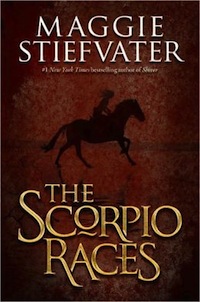
Maggie Stiefvater’s fantasy draws upon Celtic legends to create the island of Thisby, a near-future or alternate world where there are cars and radios, but no internet, and where each year the young men gather to race capaill uisce—man-eating magical water horses.
The two main characters represent two sides of society: Puck, a young, impoverished girl, wants to challenge the island’s gender norms while securing her family’s finances with the winnings from the race. Sean, an orphan raised as a man-eating magical water horse racer, believes in the strict social codes and the traditions of the past. The two racers respect each other, but only one can win.
Gossamer Axe—Gael Baudino
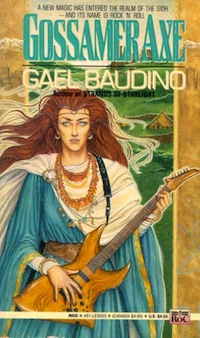
In ancient Ireland, Chairiste Ní Cummen, a harper, was trained in the secrets of music and magic, but her curiosity and pride trapped her and her lover in the realm of the Sidh. Chairiste alone managed to escape. Living in the modern world as Christa Cruitaire, a quiet harp teacher, she is all but resigned to her inability to win her beloved’s freedom, until she discovers that the volume and violence of the electric guitar and heavy metal might prove brutal enough to forcibly breach the barriers between the human and fairy worlds.
With the aid of her bandmates—who must themselves overcome inner demons of abuse, addiction, and prejudice—Christa is determined to use her newfound musical power to rescue the woman she loves.
Sadly, the book is out of print, but you can find it used!
The Etched City—K.J. Bishop
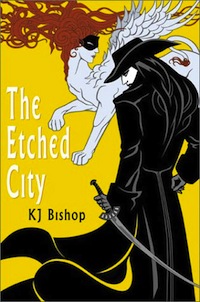
Raule is a healer, and Gwynn is a bounty hunter. Can these two mismatched friends find adventure in a new city?
What at first seems like a Victorian bildungsroman gradually becomes more obviously strange: the city the friends have come to, Ashamoil, seems to shift in geography and tone, and after the pair part ways to seek their fortunes they are face with inexplicable mysteries. Raule turns her healing abilities to a hospital staffed by nuns, but why do so many deformed babies turn up in her ward? Gwynn uses his own talents in the service of a crime lord, which is normal enough, but he’s alos entangled in the work of a mysterious artist. The city continues to warp as the characters encounter horrifying art exhibits, holy men with dark powers, and what might be drug-induced inter-dimensional travel…
Ombria in Shadow—Patricia McKillip
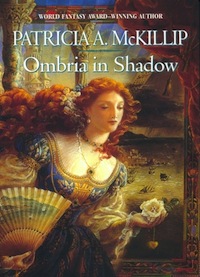
Lydea, mistress to Ombria’s ruler, Royce Greve, is driven from the castle she has called home. Greve has just died, and Domina Pearl is determined to be rid of Lydea so she can rule Ombria as regent to Greve’s son Kyel. At least until she can be rid of him, too…
But beneath Ombria, a sorceress who can wear any face she chooses works with her assistant to aid Lydea, while Greve’s bastard nephew begins hatching his own plot to free Ombria from Domina Pearl, and restore the true heir.
Ombria in Shadow won both the World Fantasy Award and the Mythopoeic Award in 2003.
To Ride Hell’s Chasm—Janny Wurts
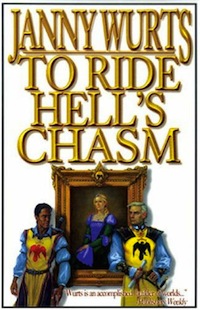
When Princess Anja fails to appear at her betrothal banquet, the tiny, peaceful kingdom of Sessalie is plunged into intrigue. Taskin, lifetime Commander of the Royal Guard, and Mykkael, a foreigner who has just won the post of Captain of the Garrison, are paired to search for her.
As the princess’s trail vanishes outside the citadel’s gates, anxiety and tension escalate. Mykkael’s investigations lead him to a radical explanation for the mystery, but he finds himself under suspicion from the court factions. Will Commander Taskin’s famous fair-mindedness be enough to unravel the truth behind the garrison captain’s dramatic theory: that the resourceful, high-spirited princess was not taken by force, but fled the palace to escape a demonic evil?
Redemption in Indigo—Karen Lord
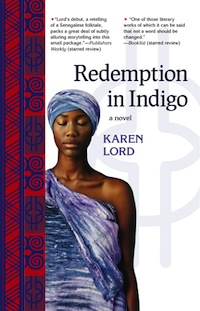
Paama is given the power of Chaos and leaves her husband Ansige—and that’s just where we start. Two years later, Ansige hires a tracker named Kwame to hunt his wife down and bring her back. Kwame doesn’t care much for the job, but he wants to travel, and this will allow him to do that. Unfortunately his quest attracks the attention of the Indigo Lord, a Djombi spirit who used to wield Chaos until he lost his power to Paama.
This Caribbean-inflected retelling of a Senegalese folktale balances hilarious chaos, multiple trickster gods, and the all-too-human emotional consequences of dealing with gods.
Butcher Bird—Richard Kadrey
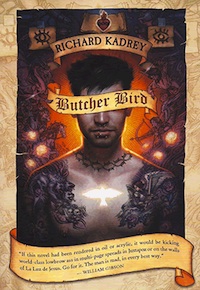
Butcher Bird mixes dark humor with even darker supernatural intrigue. Spyder is content living in San Francisco and running a tattoo shop, until a demon bite infects him with the truth. It also almost takes his head off, but luckily a blind swordswoman saves him.
But now he can see the world that most humans are blind to: a world of angels, demons, and the infinitely powerful Black Clerks. It’s the kind of world that an unassuming tattoo artist probably can’t survive, at least not without some magic, the aforementioned swordswoman, and the occasional field trip to Hell.
A Stranger in Olondria—Sofia Samatar
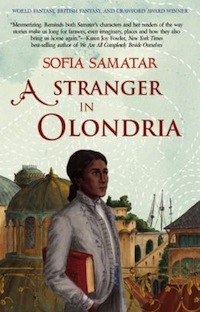
Each year Jevick’s father travels to Olondria to sell his wares, and returns home with tales of a wonderful land where books are plentiful and learning is revered. After his father’s death, Jevick gets his long-wished-for chance to see Olondria for himself, but instead of reveling in a new life of reading and romance, he is bewitched by the ghost of an illiterate girl.
When he goes to the priests for help, he finds himself caught between two warring cults, and soon realizes that in order to free himself from this curse, he must free the ghost that haunts him. But how?
Divine Misfortune—A. Lee Martinez
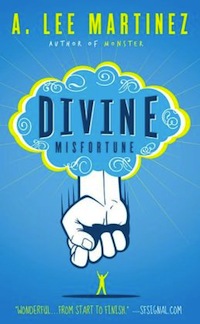
How do you pick a god? They all seem to want ridiculous things from you: blood sacrifices, tithes, chastity… Teri and Phil have always felt like they’ve done better by staying out of the god game entirely.
But when Phil’s promotion fails to come through (again) they start to look around for some divine assistance. They finally settle on a perfect match. He’s a raccoon god named Luka, and he deals in prosperity, which is exactly what the couple’s looking for. Plus, what could a raccoon possibly want from you? Well for starters, Luka needs to crash on their couch for a few days…
War for the Oaks—Emma Bull
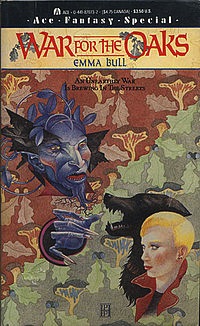
Eddi McCandry’s having a bad time. Her boyfriend’s gone—which is good—and she just quit her band—which is good. But now she feels a little adrift and her money is starting to run out. She knows she doesn’t want to get a regular day job, but if she leaves music, what else can she do?
So when a shapeshifting phouka comes into her life and tells her she needs to play a part in a battle between the Seelie and Unseelie Courts, she’s comparatively open to the idea. But why do these magical creatures need to involve a mortal in their war?
The Anubis Gates—Tim Powers
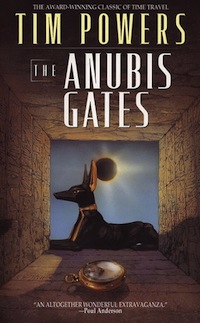
The Anubis Gates is a classic time travel fantasy that jumps form ancient Egypt to Victorian London to the 1980s. A group of British magicians attempt to summon Anubis, hoping to use the god’s power to overthrow the British Empire. This plan fails, but the spell does open gates that allow people to travel across time.
In the early 80s, an eccentric millionaire discovers the gates and gathers a few of his fellows for an outing. The (apparently deeply nerdy) group decides to attend a lecture by Samuel Taylor Coleridge, and hires a professor, Brendan Doyle, to come with them and provide commentary. Unfortunately Doyle is kidnapped and finds himself trapped in the past, working with a crew of beggars to try to get by, and befriending every Romantic poet he can find…but the magicians may not be done with their gates…
Bridge of Birds—Barry Hughart
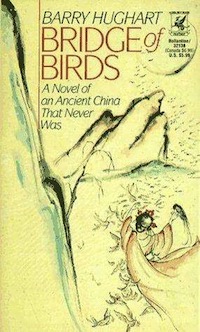
When the children in Number Ten Ox’s village begin to fall ill, he sets out on a quest to find a cure. Teaming up with master Li Kao, he journeys to find the Great Root of Power, but along the way they find adventures and challenges, labyrinths filled with monsters, tyrannical Dukes, and the key that can grant a human immortality.
The book takes place in an alternate version of China, and Hughart used the book to explore the tropes of classical Chinese novels. He also drew on a real Chinese folktale, “The Weaver Girl and the Cowherd.”
Little, Big—John Crowley
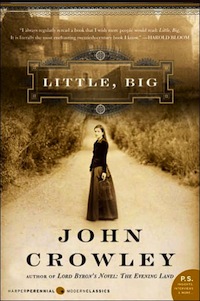
Little, Big unfolds over nearly a century as the Drinkwater clan builds an intricate relationship with the world of faerie. We meet the human family, hear rumors of magical beings, visit a dystopian City, and spend some time with a Grandfather Trout who might be a cursed prince.
Crowley isn’t afraid to slow down and ponder heady subjects like free will and fate, or to tell his story through intricate detail and gorgeous language, which led to a novel that Ursula Le Guin said, “…all by itself calls for a redefinition of fantasy,” and Thomas Disch called “the best fantasy novel ever. Period.”
Ghost Bride—Yangsze Choo
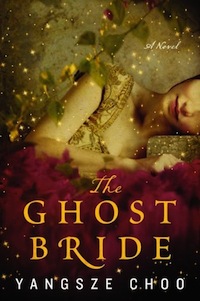
Li Lan is the daughter of a proud but fallen family. Her father’s bankruptcy has put her own future at risk, so when a marriage proposal comes from the wealthy Lim family, it seems like a blessing. But their only son died mysteriously, and the family is asking Li Lan to become a ghost bride.
The practice is not a common one, and it is often only undertaken to placate a restless spirit, factors that Li Lan must weigh against the hard fact that the marriage would give her security for the rest of her life. Her considerations are complicated when she finds herself drawn into the spirit world, and begins learning the Lim family’s secrets…and her own.
The New Moon’s Arms—Nalo Hopkinson
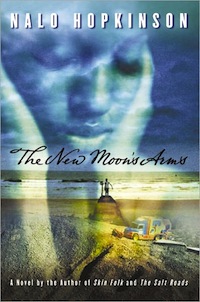
The fictional Caribbean island of Dolorosse has been Calamity’s home for 50 years. Calamity, born Chastity, has renamed herself in a way she feels is most fitting. As she begins menopause, she rediscovers her special power for finding lost things—a little tingling in the hands then a massive hotflash, and suddenly objects, even whole buildings, lost to her since childhood begin showing up around Calamity.
One of the lost things Calamity recovers is a small boy who washes up on the shore outside her house after a rainstorm. She takes this bruised but cheerful 4-year-old under her wing and grows attached to him, a process that awakens all the old memories, frustrations and mysteries around her own mother and father. She’ll learn that this young boy’s family is the most unusual group she’s ever encountered—and they want their son back.










